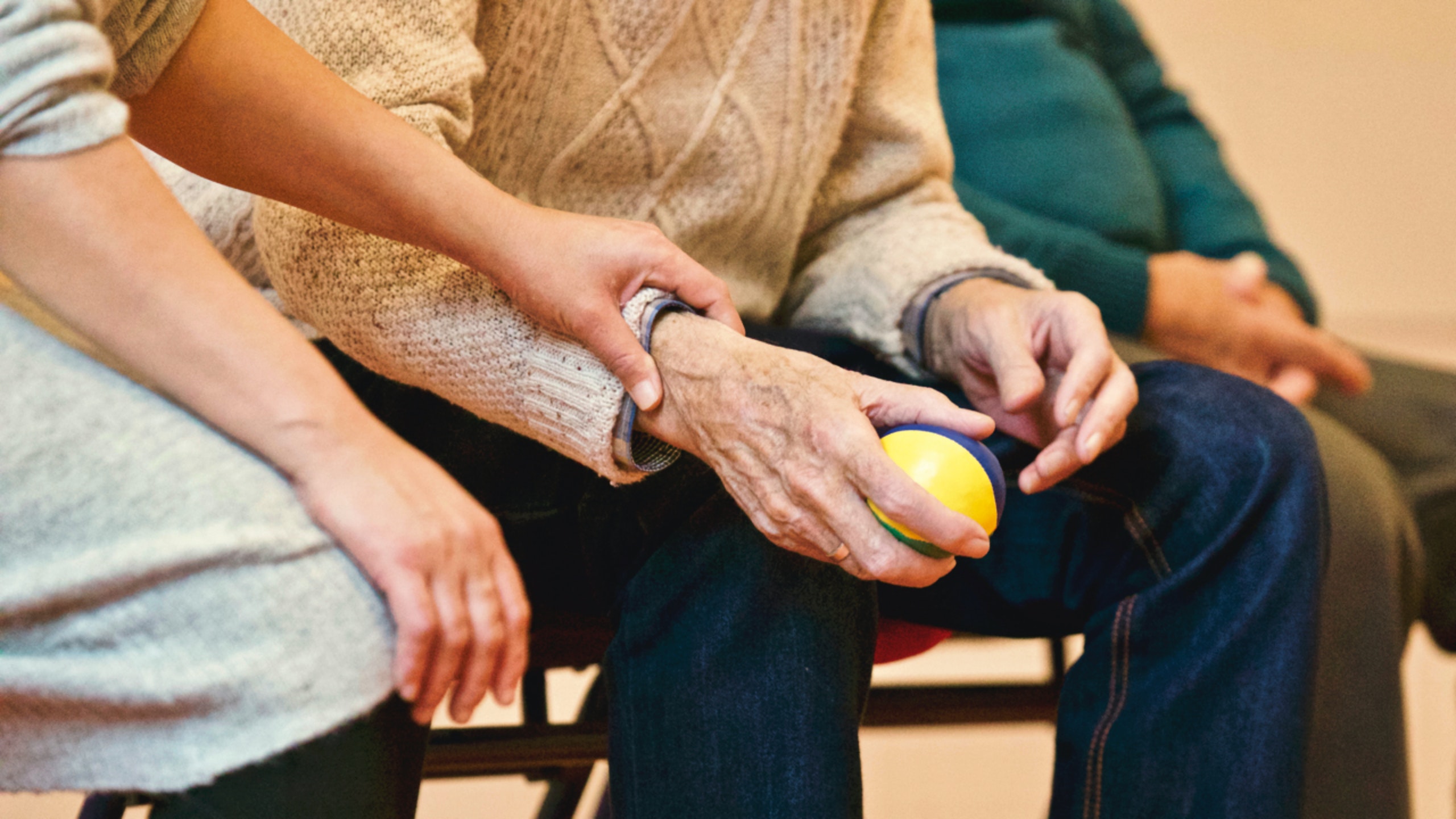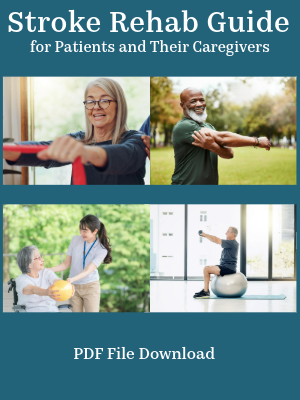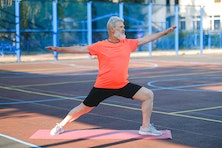Caregivers
Stroke happens suddenly, and victims include not only the stroke survivor but caregivers as well. All of a sudden, one is put in the position of having to care for a loved one who may be physically and cognitively impaired. A caregiver is often not equipped for the situation of making medical decisions, dealing with insurance, taking care of the stroke victim, juggling their schedule, and managing changes in finances. It's truly an overwhelming and emotional experience.
In the Acute Hospital

First, take a deep breath. Accept all the help that you can. Keep a notebook with you and start taking notes because you will be too overwhelmed to remember all the information shared with you.
If finances are a concern, make sure that you ask each provider in the hospital if they are covered by your insurance. Just because the hospital is covered under your plan doesn't mean all the physicians and procedures are covered under the plan. This is often far from one's thoughts, however, medical bills will come pouring in if you don't do due diligence regarding your insurance coverage.
Familiarize yourself with the effects of stroke and what is to be expected in the hospital. Make sure that your loved one is receiving appropriate medical care. It's important to be proactive. You know your loved one better than the medical staff so speak up if you have concerns.

Some important issues to address:
1) Fill out paper work - Talk to the social worker and get all the appropriate paper work completed.
2) Contact patient's employer - If you're loved one is employed, contact their employer to let them know what has happened and to find out about disability benefits.
3) Swallow study - Is your loved one swallowing appropriately, and have they had a swallow study? This is very important for stroke victims whose swallowing may become impaired. Make sure medical staff has addressed this issue. Swallowing problems may be present even if you see no symptoms.
4) Call light placement - make sure the patient's call light is placed on their strong side. The call light is of no use if a patient cannot move their hand or arm to use it.
5) Bowel and Bladder Schedule - If the patient has difficulty communicating, they might not be able to tell someone when they need to go to the bathroom. If that is the case, make sure a toileting schedule has been established. If they have no control over their bowel or bladder, make sure appropriate measures have been taken (i.e. foley catheter or adult diapers).
6) Pick a Rehabilitation Facility - Before discharge from the acute hospital, determine which type of rehab facility is best for your loved one. See rehab facilities for information about the differences between facilities.
During Inpatient Rehabilitation
Whether the stroke victim is in a skilled nursing facility or inpatient rehabilitation hospital, caregivers can help address the following issues:
1) Make sure your loved one is getting adequate care. If they are unable to feed themselves, is someone helping? Are the therapists working with your loved one providing good, quality one on one therapy? If your loved one is in a group, are they participating or being forgotten? Are medications being given at appropriate times? Is someone taking care of your loved one's personal hygiene appropriately? These are just a few of the factors in ensuring that your loved one is receiving adequate care.
2) Observe therapy sessions and learn what exercises you can do with your loved one at home. Therapists will normally give home exercise programs to patients, but don't let this occur on the last day of therapy. Start learning the exercises early so you will not have any questions about exercise technique when you get home. If you wait to the last day to learn exercises, you won't be adequately trained.
3) Arrange time for yourself. Once you feel comfortable that your loved one is in good hands, arrange some time for yourself while they are in therapy. Once your loved one gets home, you may not have the opportunity to get as many errands done or get the time to yourself that you need. Take advantage of the time you can schedule for yourself while your loved one is occupied with therapy.
4) Find a support group. Check to see if there is a local support group for caregivers or go online to a support forum. This can be helpful in getting questions answered, receiving emotional support and getting advice from people who have "been there".

5) Make a list of questions as you go. Don't be afraid to ask your questions. While your loved one is in rehab, you will have access to doctors, nurses and therapists. Now is the time to get your questions answered. Once you get home, you will not have the easy access to medical personnel so ask questions since you have this opportunity.
6) Prepare for home. Make sure the stroke victim's house is accessible. Things to consider:
- Are the doors wide enough for wheelchairs?
- Is the shower and toilet accessible?
- What medical equipment do they need at home?
- Are there any trip hazards?
- Are there animals that will need to be moved out of the way?
- Are there any steps to maneuver?
- What type of flooring is there, and will it interfere with walking or pushing a wheelchair?
- If the patient is in a wheelchair, are items moved within their reach?
- If the patient is incontinent, are there adult diapers stocked?
- If the patient has swallowing issues, dp you have the appropriate food and drink in the house?
- If the patient needs 24 hour supervision, is there adequate help whether it be family, friends, or hired caregivers to assist? This job should not fall on only one person!
A great website with checklists for caregivers when leaving the hospital is https://www.nextstepincare.org/Caregiver_Home/.
The Return HomeOnce the patient is home, continue to help the patient with recovery. Follow through with home exercises. Patients will probably be receiving home health or outpatient therapy. Make sure they are making it to their scheduled visits. Don't forget to make time for yourself. |
 |
Contact friends and family for help or hire caregivers so that you can have some "me" time. If you don't take care of yourself, you will not be able to take care of a stroke victim. Continue to be involved with a local stroke support group or online support forum. Stroke recovery is a slow, arduous process. It will involve patience, compassion and frankly a lot of hard work from caregivers especially if caring for a stroke survivor who has severe impairments.
You can visit the resource section of this website for other helpful information and links or visit the caregiver assistance page for a list of websites dealing with caregiving.
Do you have a stroke survival or caregiver story to share with others? Share your story.
Get Our Stroke Rehab Guide

Our stroke rehab guide is designed specifically for patients and caregivers. It's in pdf format and can be immediately downloaded. It includes about
- Stroke Definition & Causes
- Stroke Treatment
- Rehabilitation Information for Physical, Occupational and Speech Therapy
- Exercise pictures
- Q&A from patients and caregivers
- Adaptive Equipment & Techniques
- How to Prevent Another Stroke & More!
Medical Disclaimer: All information on this website is for informational purposes only. This website does not provide medical advice or treatment. Always seek the advice of your physician or other healthcare provider before undertaking a new healthcare or exercise regimen. Never disregard professional medical advice or delay seeking medical treatment because of something you have read on this website. See the disclaimer page for full information.
- Home
- Info for Caregivers













